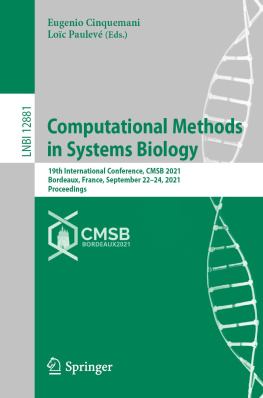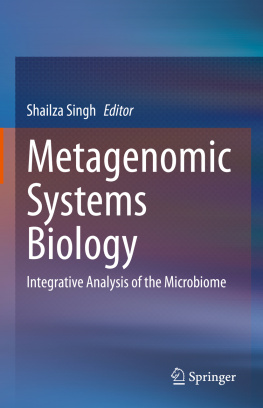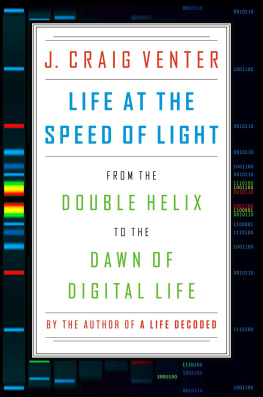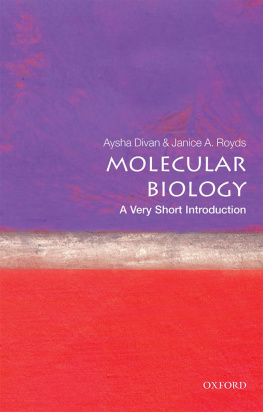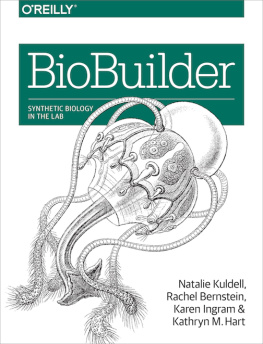

Published by
Imperial College Press
57 Shelton Street
Covent Garden
London WC2H 9HE
Distributed by
World Scientific Publishing Co. Pte. Ltd.
5 Toh Tuck Link, Singapore 596224
USA office: 27 Warren Street, Suite 401-402, Hackensack, NJ 07601
UK office: 57 Shelton Street, Covent Garden, London WC2H 9HE
British Library Cataloguing-in-Publication Data
A catalogue record for this book is available from the British Library.
SYNTHETIC BIOLOGY A PRIMER
Copyright 2012 by Imperial College Press
All rights reserved. This book, or parts thereof, may not be reproduced in any form or by any means, electronic or mechanical, including photocopying, recording or any information storage and retrieval system now known or to be invented, without written permission from the Publisher.
For photocopying of material in this volume, please pay a copying fee through the Copyright Clearance Center, Inc., 222 Rosewood Drive, Danvers, MA 01923, USA. In this case permission to photocopy is not required from the publisher.
ISBN-13 978-1-84816-862-6
ISBN-10 1-84816-862-4
ISBN-13 978-1-84816-863-3 (pbk)
ISBN-10 1-84816-863-2 (pbk)
Typeset by Stallion Press
Email:
Printed in Singapore.
Front cover The Synthetic Kingdom by Daisy Ginsberg
How will we classify what is natural or unnatural when life is built from scratch? The Tree of Life is always changing, ever since we first created it. Now, synthetic biology is turning to the living kingdoms for its materials library. No more petrochemicals: instead, pick a feature from an existing organism, locate its DNA and insert into a biological chassis. Engineered life will compute, produce energy, clean up pollution, kill pathogens and even do the housework.
These synthetic organisms are no different from other life forms, except that we invented them. Well simply have to insert an extra branch to the Tree of Life to classify them. Perhaps the Synthetic Kingdom is part of our new nature?
The Synthetic Kingdom mirrors synthetic biologys ideology: its a future fashioned by engineering logic, a rationalisation of the complexity of living systems, an engineering solution to an engineering problem. But it also puts our designs back into the complexity of nature rather than separating us from them.
Copyright 2009 Daisy Ginsberg (http://daisyginsberg.com/)
Contents
List of Contributors
Editors and Contributors:
Paul Freemont ()
Paul Freemont is co-principal investigator of the Molecular Structure and Function laboratory, Chair of Protein Crystallography, Head of the Division of Molecular Biosciences and co-Director of the EPSRC Centre for Synthetic Biology and Innovation at Imperial College London. He joined Imperial in 2000 as Director of the Centre for Structural Biology after leaving the Cancer Research UK London Institute, where he established experimental structural biology research in 1988, following a postdoctoral fellowship at Yale University working with Professor Tom Steitz. Professor Freemonts interdisciplinary research interests have focused on understanding the molecular mechanisms of diseaselinked proteins. He has also developed statistical approaches for the spatial analysis of nuclear architecture in normal and cancer cells. More recently he has developed research interests in synthetic biology, concentrating on biosensors for pathogenic organisms and part/device characterisation protocols. He co-founded the EPSRC Centre for Synthetic Biology and Innovation with Professor Richard Kitney. The Centre is the first of its kind in the UK and aims to develop an engineering framework and new technology platforms to enable synthetic biology research in areas of bioenergy, biosensors, biomaterials and metabolic engineering. He and Professor Richard Kitney have been responsible for six highly successful imperial college iGEM teams.
Richard Kitney ()
Richard Kitney is Professor of BioMedical Systems Engineering, Chairman of the Institute of Systems and Synthetic Biology and co-Director of the EPSRC Centre for Synthetic Biology and Innovation. He was the co-Chair of the joint Inquiry by the Royal Academy of Engineering and the Academy of Medical Sciences on Systems Biology. The report of the Inquiry Systems Biology: a vision for engineering and medicine was published in February 2007. He also was Chair of the Royal Academy of Engineering Inquiry into Synthetic Biology Synthetic Biology: scope, applications and implications was published in May 2009. He is also a member of the Royal Society Working Party on Synthetic Biology. He has worked extensively in the United States and has been a Visiting Professor at MIT since 1991. He is a co-Director of the Imperial CollegeMIT International Consortium for Medical Information Technology. Professor Kitney is now working extensively in synthetic biology and is heading Imperial Colleges initiative in this area with Professor Paul Freemont. They have been responsible for six highly successful Imperial College iGEM teams.
Contributors:
Geoff Baldwin ()
Geoff Baldwin joined Imperial College in 2000 as a BBSRC David Phillips Fellow and is now a Reader in Biochemistry within the Division of Molecular Biosciences and Centre for Synthetic Biology and Innovation. A chemistry graduate from the University of East Anglia, he moved into molecular biology and biochemistry during his PhD at the University of Sheffield on DNA modifying enzymes. He followed his PhD studies with a postdoctoral fellowship at the University of Bristol, Department of Biochemistry, working with Professor Steve Halford FRS. Dr Baldwin still continues to work across interdisciplinary boundaries and in recent years his quantitative approach to studying biological systems at the molecular level has found a new outlet in synthetic biology. His research includes elucidating DNA repair mechanisms, developing methods for in vivo directed evolution, DNA assembly and part characterisation.
Travis Bayer ()
Travis Bayer joined Imperial College in 2010 as an investigator at the Centre for Synthetic Biology and Innovation and a lecturer in the Division of Molecular Biosciences. Dr Bayer obtained his undergraduate degree at the University of Texas at Austin and his PhD at Caltech, working with Professor Christina Smolke. He followed his PhD studies with a postdoctoral fellowship at UCSF, working with Professor Chris Voigt on metabolic pathway engineering using synthetic biology. Dr Bayers laboratory at Imperial aims to understand the structure, function and evolution of complex metabolic and regulatory systems with a goal to develop biological technologies to enhance global health and sustainability. As exemplars he is working on metabolic pathways for renewable liquid fuels, materials and pharmaceutical precursors.
Robert Dickinson ()
Robert Dickinson is a senior lecturer in the Department of Bioengineering, Imperial College. He graduated with a degree in physics from Cambridge University, and then obtained a PhD in biophysics from the University of London, in ultrasound signal processing. Dr Dickinson has extensive experience in medical imaging, in both hospital and industrial environments. He worked on MRI coil development and system integration at Picker International Ltd, and ultrasound imaging in a small start-up company, where he developed a sub-1mm intravascular ultrasound imaging catheter for imaging coronary arteries. He has substantial experience in bio-compatibility and other issues of invasive medical devices, together with commercialisation and IP transfer. He has filed over 12 patents, and has CE-marked a number of medical devices. He has worked with Emcision Ltd on their range of electrosurgical devices.
Next page

